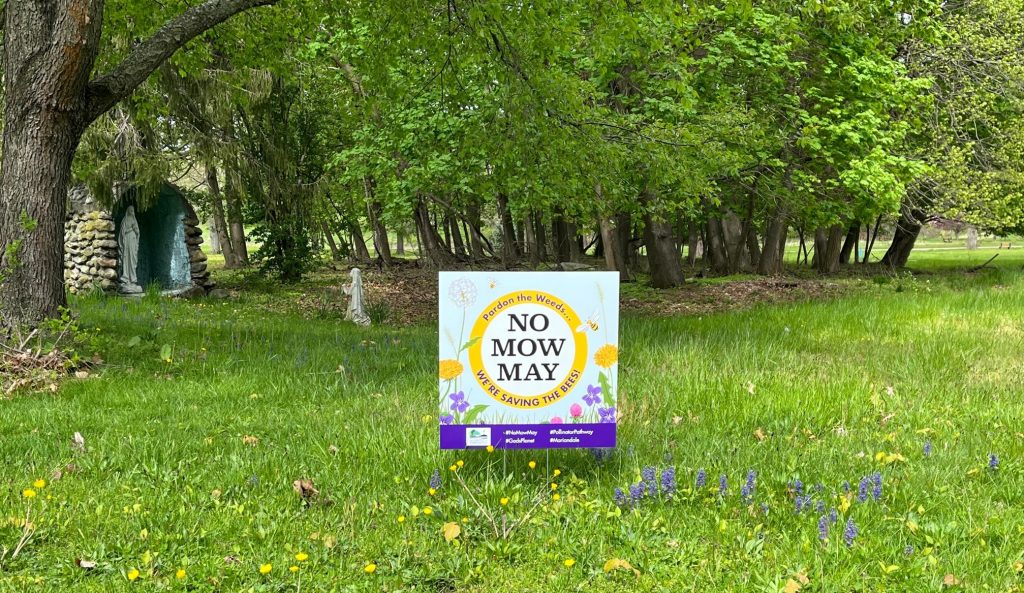No Mow May
Last month, visitors to The Center at Mariandale noticed more color on what has traditionally been tightly mown lawn — yellow dandelions, white clover, purple bugleweed, and colorful signage announcing the Dominican Sisters of Hope’s participation in No Mow May. The Earth care initiative has gained popularity and publicity in recent years as a way to boost the pollinator population.
A research study based on lawns in Wisconsin showed “No Mow” lawns had fivefold higher bee abundance and three times the diversity of bees than lawns mowed during the month of May, according to Regina Blakeslee, a master gardener who brought the initiative to Mariandale. Bees vital to the global ecosystem and necessary for food production have been declining in number as a result of pesticide use and habitat loss. Spring is when many come out of hibernation, making May an important month for their feeding. Blakeslee introduced No Mow May to Dominican Sisters of Hope and Mariandale staff early in the month, presenting it as a way to “live Laudato Si’.”
Dominican Sisters of Hope living in community in Newburgh, NY decided to take up the challenge at home. “No Mow May is messy, but so worth it,” said Sr. Catherine Walsh. “If we save some bees, it is not a sacrifice.” The community thought through the impact of their choice on the people they would normally pay to mow their lawn. “Those folks count on the income,” Walsh said, explaining their decision to continue paying for lawn service through the month of May.
Some staff of the Dominican Sisters of Hope and The Center at Mariandale have also decided to try No Mow May at home. Nick Travis works as the congregation’s IT coordinator and lives in Ossining. “Normally I keep my grass at three inches, I do nice edging along the sidewalks,” he said. “It looks like a golf course.” With the return of warmer weather in April, Travis began noticing bees and other insects. “Then when we had the meeting I connected the dots,” he said. When he eventually decided to mow his half acre lawn, he chose to let two sections grow. Prior to learning about No Mow May, Travis said he would not have noticed any flowers, but this time he intentionally avoided mowing areas where buttercups and other “weeds” had sprouted, leaving them for the bees. He credits this and other gradual changes towards ecological sustainability as inspired by working for the Dominican Sisters of Hope.
Further up the Hudson Valley in Cold Spring, Jane Hanley, who works as the Marketing Strategist for the Center at Mariandale, is letting her entire yard grow. She was particularly struck by statistics Blakeslee shared about insect decline. “It used to be that you’d drive, and insects would be all over [the windshield],” Hanley said. “And now they’re not, and it makes a huge hole in the [food] chain.” As the month has gone on, a neighbor decided to try it in her own yard too, saying “I saw your sign when I was driving by, and I came home and talked to my husband, and we agreed to do it.” If every homeowner took responsibility for their own patch of land, prioritizing native plants, pollinator habitats, and removing invasive species, we could make great progress towards sustainability, Hanley observed.
Even if you don’t have a yard, you can grow pollinators in planters or window boxes, according to Blakeslee.
You can see photos of No Mow May at Mariandale and join the conversation #DominicanSistersOfHope #Mariandale #NoMowMay #PollinatorPathway #GodsPlanet.
 USA
USA



